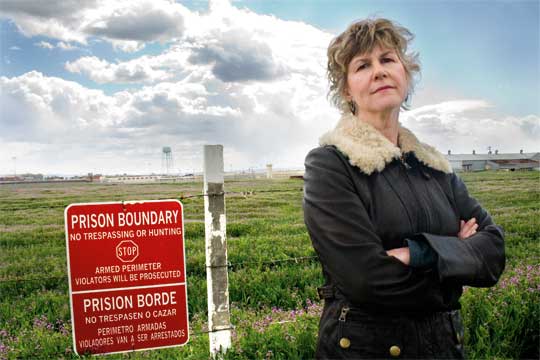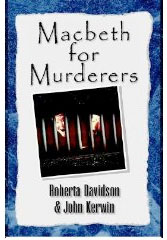Behind closed doors

by Roberta Davidson
Professor of English
I have taught Shakespeare for more than 20 years, and, like all teachers, I learn from my students as I teach them. But no group of students ever taught me more about Shakespeare’s plays or about myself than the class I taught at the maximum security Washington State Penitentiary in Walla Walla. To this day, the impact of that experience on my teaching extends into my Whitman classroom.
I wrote a book about my experiences teaching Shakespeare’s plays to violent criminals. It’s called “Macbeth for Murderers” and was co-written with John Kerwin, (XLibris Press, 2007). As well as the personal accounts of my prison students about their crimes and what went through their minds when they committed them, it’s also about the struggle of dedicated teachers like John to give these men a chance at new lives (and, in doing so, make the rest of us safer).
 The book also explains how a nice middle-class, Ivy League lady like me, with an experience of evil drawn from books, found herself behind prison walls with a roomful of “experts” on the subject, so I won’t go into the details here. I will describe, however, how my time spent in prison contributes to my Whitman students’ education to this day.
The book also explains how a nice middle-class, Ivy League lady like me, with an experience of evil drawn from books, found herself behind prison walls with a roomful of “experts” on the subject, so I won’t go into the details here. I will describe, however, how my time spent in prison contributes to my Whitman students’ education to this day.
I try to restrict how much class time I spend talking about the prisoners I taught, but some plays demand the connection. For example, “Othello.” How can I resist reading them the story, narrated by a young man their own age, about how he murdered his girlfriend in a jealous rage and repented it almost immediately, when his experience reveals so much about the truth of Othello’s characterization? Perhaps, it is a rather heavy dose of reality at 10 in the morning, but it makes the play come alive for my Whitman students (and, based on the wideness of their eyes, it’s more effective than coffee at waking them up).
Even more than listening to my former murderer-students speak for themselves, however, Whitman students seem to enjoy hearing about my own experiences teaching at the penitentiary. I have to be careful not to agree every time they ask me to tell them one of those stories — the class, after all, is about Shakespeare, not me.
Every now and then, though, in the last few minutes of a class, I’ll tell them about something that happened when I was teaching whichever play we’re discussing at the time. I like to show them that their interpretations of the plays can be surprisingly similar to those of the inmates. On the other hand, I acknowledge that I never have to worry about breaking up classroom fights (“Othello”), or being accused of practicing witchcraft (“Macbeth”), or being stalked (“Hamlet,” but I don’t think there was a connection) when I’m teaching at Whitman.
These stories are fun and educational, but they can have a detrimental effect on my students’ punctuality. One day I told my current class about my first day of teaching at the penitentiary, and how a rapist and an armed robber nearly came to blows over their conflicting interpretations of Desdemona’s character. A student came up to me as the rest of the class was leaving and asked what happened next. Obligingly, I described how my stealthy approach to the prospective combatants (with the laudable but, in retrospect, idiotic idea of inserting myself between them) ended in breaking up the fight because the sight of me stalking the robber amused him so much that he couldn’t keep a straight face.
The Whitman student laughed, and so did most of the 25 other people still in the room. I realized that, although the members of the class had risen and picked up their books and backpacks, and the clock indicated that their next classes were beginning, not a student had left while I was finishing my story. Even a couple of the next period’s students, waiting in the hallway, were listening. Since then, I’ve been more careful about my timing.
Nonetheless, I never hesitate to share with my students the most important lesson I learned from the inmates: the human potential for transformation, and the power of art to transform us. We are all, in a way, like plays. (Shakespeare called us all actors, alike in our performances upon the stage of this world.)
Undergraduates are comedies — bright, lively, sometimes confused and self-contradictory — but filled with possibilities. As we grow older, some lives come more closely to resemble the tragedies, when our individual desires confront life’s inevitable restrictions. Although, fortunately, not every outcome is necessarily as tragic as those of my penitentiary students, the truth is that few of us make it through an entire lifetime without mistakes. How fortunate for us, then, that at the end of his brilliant career, Shakespeare turned to writing romances, those moving, almost mystical plays about redemption and second chances.
I have seen with my own eyes the power of those plays on hearts hardened by grief and remorse, and on minds resistant to hope through continual disappointment. I will never forget the day that I taught “The Winter’s Tale.” It is a story about a man who is responsible for his wife’s death, who repents his actions too late. For 16 years, he suffers for what he has done. Then, one day, he has the opportunity to look at a statue of her, an image that is exquisitely painful to him because of his guilt.
The woman who shows him the image offers to close the curtain, to avoid causing him more pain. “No!” he says. “Not this 20 years.” When he could have looked away, he chooses instead to face what he has done, and the image of the woman whom he loved and destroyed. That, of course, is the key to the magic that follows. His wife returns to life, accepts her husband’s repentance, forgives him and takes him in her arms. Shakespeare accompanies the charm that restores her with music, but even the unadorned words have power to move the listener:
’Tis time; descend; be stone no more; approach;
Strike all that look upon with marvel. Come;
I’ll fill your grave up. Stir; nay, come away;
Bequeath to death your numbness; for from him
Dear life redeems you.
I spoke these lines in front of a roomful of men whose lives had become death-in-life, whose spirits were stony, whose hearts were nearly numb. When I looked up, I saw that Shakespeare’s charm had worked upon my students, much as it had upon the statue in the play. Life filled their faces, hope and longing seemed to run through them like an electric shock. Hidden in a corner, my most hate-filled student looked back at me, white-faced, his eyes filled with tears. It is not an exaggeration to say that Shakespeare’s words brought men’s souls back from death that day. The class ended, but the plays’ effects remained. What happened in the coming months … but I’m afraid I have reached the end of my time and space to speak to you today, and the rest of my story must wait for another time.
“Macbeth for Murderers” is available at the Whitman Bookstore, (509) 527-5274. Roberta Davidson received her bachelor’s degree from Sarah Lawrence College and her Ph.D. from Princeton University. She joined the Whitman faculty in 1988.